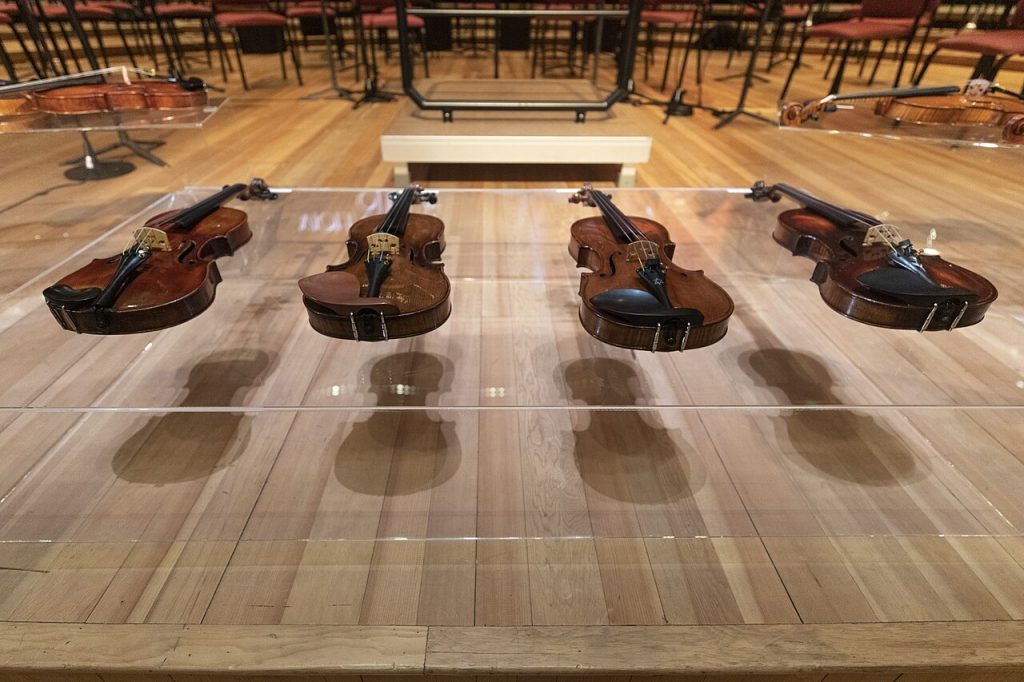Present Music Offers ‘Violins of Hope’
Concert will mix old and new in reflecting on World War II and the Holocaust.

Violins of Hope. Photo by Ministerio de Cultura de la Nación, (CC BY-SA 2.0), via Wikimedia Commons
The Woman’s Club of Wisconsin, in partnership with Present Music, contributes to a five-month calendar of music and lectures honoring the Violins of Hope with a concert on Friday, Sept. 12.
Violins of Hope comprises a private collection of violins, violas, and cellos, all of which were collected since the end of World War II. Many of the instruments belonged to Jews before and during the war. Weaving a tapestry throughout our community, the Violins of Hope-Wisconsin residency will tell stories of instruments from the Holocaust, and the musicians who played them. The many events are listed on the local Violins of Hope website.
Present Music is represented by a string quartet: violinists, Ji-Yeon Lee & Kyung Ah Oh, violist Erin Pipal, cellist Adrien Zitoun and pianist, John Orfe. The string players are all members of the Milwaukee Symphony Orchestra.
The concert selects from contemporary classics by Steve Reich and Olivier Messiaen and introduces many of us to the 21st-century composer Yotam Haber.
Haber’s path from the Netherlands to Israel to Nigeria was followed by several years in the Milwaukee area. He graduated from Nicolet High School in 1994. He currently serves as an Associate Professor of Composition at Boston University. His compositional achievements earned him won him a coveted one-year fellowship – The Rome Prize – where he studied Jewish traditional music in Italy, notably in the Piedmont region. He has incorporated this legacy material into a series of works.
Haber will be a guest of the evening performance.
Two of Haber’s works draw from a sacred Hebrew prayer, Avinu Malkenu, featured between Rosh Hoshanah and Yom Kippur. The first, From the Book of Sustenance and Maintenance (2014) was written for viola and piano. The viola serves as the Cantor reflecting the words of Avinu Malkenu:
Our father our king, hear our voice
Our father our king, we have sinned before you
Our father our king, Have compassion upon us
and upon our children.
The rest of the text may be found in a more traditional representation of this prayer on YouTube. As part of a commission by the Kronos Quartet, From the Book (2016), Haber revisited the Avinu Malkenu, incorporating the quartet often as a single instrument. The tone of each work reflects the prayer, drawing from traditional sacred Hebrew melodies of the Piedmont region that differ in part from those usually accompanying the Avinu Malkenu. Haber interprets the melody using contemporary techniques, introducing a tender dissonance that fits the occasion, deepening the meditative atmosphere.
Reich emerged as a leading composer of the minimalist movement with his composition Different Trains (1988). He compares personal adventures as a child riding trains in America from New York to Los Angeles to the terror of a train taking Jews and others to concentration camps in Poland. Short segments of voices generate musical material for the string quartet, matching the tone and rhythm of the speakers. Other samples include the sounds of trains – their whistles and their tremendous power as they thunder across the countryside.
In the first section, a porter’s voice may be heard:
One of the fastest trains
Crack train from New York
From New York to Los Angeles
Different trains everyday
In the second section, words imagine a European deportation:
No more school
You must go away
And she said, “Quick, go!”
And he said, “Don’t breathe”
Into the cattle wagons
And for four days and four nights
And a concluding section imagines survivors of the Holocaust riding trains in America:
Then the war was over
Are you sure?
The war is over
Going to America
To Los Angeles
The concluding music conveys both relief and lingering anxiety.
The sonic texture is enriched by a live quartet playing alongside sampled sounds and layered recordings of three other quartets (The tracks are all recorded by the Kronos Quartet, who premiered the work).
Musicologist Richard Taruskin recognized Different Trains as “the only adequate musical response to the Holocaust.”
The program also includes a selection from a monumental work, Quartet for the End of Time (1941), by French composer Messiaen.
All of the works selected for this concert match the moment. Whether the meditative prayer of the two works by Haber, the tension of Reich’s Different Trains, or the apotheoses achieved by Messiaen’s search for spirituality in music, the choices are ideally appropriate for an event marking the presence of the Violins of Hope in our community.
The concert is scheduled from 4 p.m. on Friday, Sept. 12, in the intimate ballroom of the Woman’s Club of Wisconsin at 813 E. Kilbourn Ave. The Woman’s Club is offering a multi-course Polish dinner as an additional option following the concert. Exhibits about the Violins of Hope will be on display. Tickets may be purchased online.
Present Music will repeat the concert on Sept. 28 at 7:30 p.m. at Token Creek Chamber Music outside of Madison.
If you think stories like this are important, become a member of Urban Milwaukee and help support real, independent journalism. Plus you get some cool added benefits.
Preview
-
A Sacred Choir, 70 Voices Strong
 Dec 14th, 2025 by Martha Brown
Dec 14th, 2025 by Martha Brown
-
Prometheus Trio Goes Bohemian
 Dec 3rd, 2025 by Martha Brown
Dec 3rd, 2025 by Martha Brown
-
Present Music Offers New Choral Works
 Nov 20th, 2025 by Michael Barndt
Nov 20th, 2025 by Michael Barndt




















